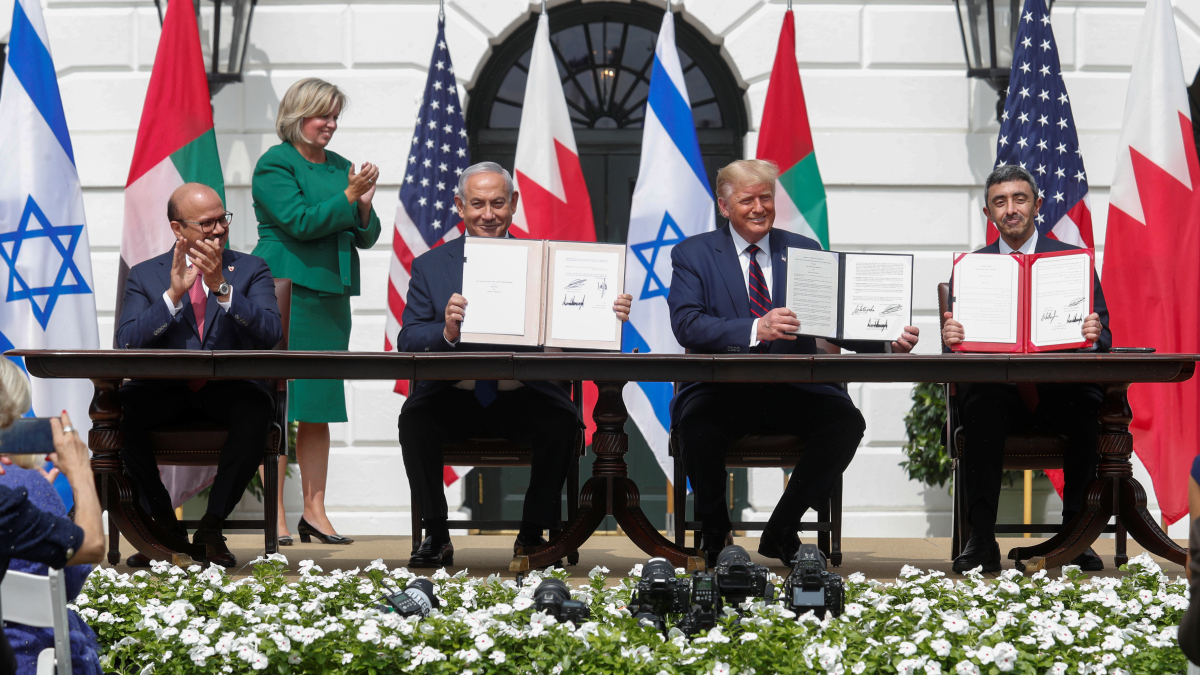Four Syrian internal security personnel killed in ISIS checkpoint attack west of Raqqa
Four members of Syria’s Internal Security Forces were killed on Monday in an attack by the ISIS (Daesh) terrorist group targeting a checkpoint west ...

As Kazakhstan becomes the latest nation to join the Abraham Accords on Friday, here's all you need to know about the agreement and why it matters.
The Abraham Accords is framework that normalised diplomatic relations between Israel and some of its neighbours in the middle East.
According to Britannica, The name of the accords was given in reference to the biblical Abraham, whom Jews and Arabs consider as their common ancestor, and as an expression of brotherhood.
The signing ceremony took place on 15th September 2020 at the White House in Washington, an event which was attended by the Bahraini Foreign Minister Abdullatif al-Zayani, Israeli Prime Minister Benjamin Netanyahu, President Donald Trump during his first stint at the White House and the UAE Foreign Minister Abdullah bin Zayed Al-Nahyan.
The deal brokered by President Trump initially involved Bahrain and the United Arab Emirates was supposed to be a strategic realignment of Middle Eastern countries against Iran.
By the end of 2020, The Sudan and Morocco also recognised Israel's legitimacy, however as of 2024, Sudan's agreement remains unratified.
Kazakhstan had already established diplomatic ties and several bilateral agreements with Israel, so its accession to the agreement is largely seen as symbolic.
How did the World react?
The announcement and the subsequent signing of the Abraham Accords were mixed; enthusiasm in some quarters, followed by criticism on the other hand.
The UK, a long term ally of the United States welcomed the development with the then foreign secretary Dominic Raab callling it a "historic step".
"This is an historic step which sees the normalisation of relations between two great friends of the UK. We welcome both the decision by the UAE to normalise relations with Israel, as well as the suspension of plans for annexation—a move the UK has opposed as it would have been counterproductive to securing peace in the region."
In the Middle East, a different outcome was unfolding, on the one hand, the Hamas group called the initial Israel - UAE deal a "stab in back of Palestinians".
In a statement issued by his spokesman, Palestinian President Mahmoud Abbas denounced the accord.
“The Palestinian leadership rejects and denounces the UAE, Israeli and US trilateral, surprising announcement,” said Nabil Abu Rudeineh, a senior adviser to Abbas.
Türkiye and Iran condemned the agreements, saying that the move undermined the Palestine cause.
On the other hand, the UAE’s minister of state for foreign affairs, Anwar Gargash, defended the deal, saying the decision to normalise ties with Israel reflected "badly needed realism".
Jordan opined that the UAE-Israel deal coud push forward stalled peace negotiations which could eventually spur Israel on to accept a Palestinian state on land it occupied.
What happens next?
President Trump says he is optimistic that other countries would join the Accords which normalise relations with Israel.
At a press briefing announcing Kazakhstan’s decision to join in the agreement, he said he was optimistic that some of the countries would reap the benefits of peace if they embraced the opportunity he was presenting.
“The Abraham accords are very sought after right now, we’re gonna be announcing some very important countries that are joining” he said.
A seven-month-old Japanese macaque has drawn international attention after forming an unusual bond with a stuffed orangutan toy after being rejected by its mother.
Divers have recovered the bodies of seven Chinese tourists and a Russian driver after their minibus broke through the ice of on Lake Baikal in Russia, authorities said.
Pakistan said it carried out cross-border strikes on militant targets inside Afghanistan after blaming a series of recent suicide bombings, including attacks during the holy month of Ramadan, on fighters it said were operating from Afghan territory.
Italy said a fond farewell to the Winter Olympics on Sunday with an open-air ceremony in the ancient Verona Arena that celebrated art and sporting achievement at a Games lauded as a model for how to stage such events.
Ukraine’s President Volodymyr Zelenskyy has approved new sanctions targeting Russian maritime operators, defence-linked companies and individuals connected to Moscow’s military and energy sectors, according to official decrees issued on Saturday.
The United Nations mission in Afghanistan said on Monday it had received “credible reports” that at least 13 civilians were killed and seven others injured in overnight Pakistani airstrikes inside Afghanistan.
The former British ambassador to the U.S. Peter Mandelson has been arrested by police in London on suspicion of misconduct in public office.
At least 25 members of Mexico's National Guard have died during a wave of violence in the state of Jalisco after the killing of a drug lord, the country's security minister has said.
The European Parliament on Monday (23 February) postponed a vote on the EU’s trade deal with the U.S. after President Donald Trump imposed a blanket 15% import duty.
The U.S. Supreme Court has overturned key elements of President Donald Trump’s global tariff policy, creating uncertainty ahead of his March meeting with China’s Xi Jinping. The ruling raises fresh questions about the future of U.S.-China trade relations and the stability of the global economy.
You can download the AnewZ application from Play Store and the App Store.

What is your opinion on this topic?
Leave the first comment